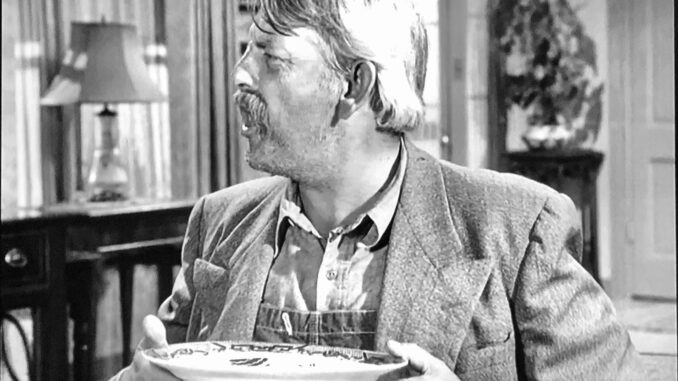
How Aunt Bee Tamed Mr. Darling with Grace
In the bucolic, often predictable world of Mayberry, where common sense usually prevailed and eccentrics were lovingly tolerated, one figure stood out for his almost mythical reclusiveness: Briscoe Darling Jr. A man of the mountains, fiercely independent, and bound by ancient, unyielding traditions, Mr. Darling was a fascinating study in obstinacy. He resisted all conventional attempts at integration, baffled the sheriff, and frustrated the deputy. Yet, it was the unassuming, gentle hand of Aunt Bee Taylor who, with a quiet, persistent grace, managed to not merely pacify but genuinely “tame” this wild mountain spirit, not by force or logic, but through an unwavering, empathetic understanding.
Mr. Darling, with his solemn countenance, his loyal family of banjo-strumming sons, and his unshakeable belief in the old ways, was less a person than a force of nature. He was suspicious of town folk, dismissive of modern conveniences, and utterly devoted to his isolated homestead. Attempts by Andy, usually the town’s most effective diplomat, often resulted in a comical standoff, a respectful but firm refusal. Barney’s nervous bluster was entirely ineffective. The Darlings operated on a different wavelength, one that defied the usual social contracts of Mayberry. To approach Mr. Darling with demands, with judgment, or even with well-meaning but ill-suited advice, was to watch him retreat further into his shell, or worse, launch into a mournful, defiant ballad.
Aunt Bee’s initial strategy, if it could be called a strategy at all, was simply an extension of her natural inclination: to nurture, to care, and to make things pleasant. Unlike others, she harbored no preconceived notions or judgments about Mr. Darling’s eccentricities. She saw a man, perhaps lonely, certainly set in his ways, but deserving of the same kindness she extended to everyone. Her first weapon in this gentle campaign was often a simple, home-cooked meal. Food, the universal language of comfort and hospitality, bridged the chasm between their worlds. A fresh-baked pie, a jar of homemade pickles, or a pot of savory stew, delivered without expectation or demand, slowly chipped away at Mr. Darling’s formidable defenses. These were not offerings of charity, but gestures of shared humanity, acknowledging a need without articulating it, and respecting his independence by not imposing on it.
Crucially, Aunt Bee understood that Mr. Darling's isolation was not merely physical but spiritual. His music, his haunting ballads, were not just entertainment but an expression of his very soul. While others might find his banjo playing peculiar or disruptive, Aunt Bee listened. She didn't critique; she appreciated. When the Darlings came to town, often a cause for Mayberry residents to brace themselves, Aunt Bee remained unruffled. She never tried to force Mr. Darling into conformity, but rather found ways to meet him where he was. She understood that respect for his traditions and his way of life was paramount. She might gently suggest a slight adjustment, like playing a hymn for the choir, but she never demanded, never ridiculed, and never shamed. Her influence was that of a gentle stream eroding rock, not a battering ram.
One of the most illustrative instances of Aunt Bee’s grace in action was her ability to bring Mr. Darling into a communal setting without him feeling trapped or judged. When the town needed a bass singer for the choir, and it became clear that only Mr. Darling's booming, low notes could fill the void, it was Aunt Bee who facilitated his inclusion. She didn't cajole or pressure. Instead, she offered a space where his unique talent was not only tolerated but genuinely needed and celebrated. She created an environment where his participation felt like a contribution, not a concession. He was still Mr. Darling, still dressed in his mountain clothes, still holding his unique worldview, but through Aunt Bee’s quiet guidance, he found a way to connect, however briefly, with the wider community on his own terms.
Aunt Bee’s "taming" of Mr. Darling was not about changing him into someone he wasn't, but about expanding his world to include a measure of acceptance and connection. Her grace lay in her patience, her non-judgmental empathy, and her unwavering belief in the power of simple kindness. She taught Mayberry, and by extension, us, that to truly reach those who stand apart, one must not try to force them into a mold, but rather build a bridge of understanding, brick by gentle brick. In a world often quick to label and dismiss, Aunt Bee’s approach to Mr. Darling stands as a timeless lesson in the profound and transformative power of genuine, unadulterated grace.